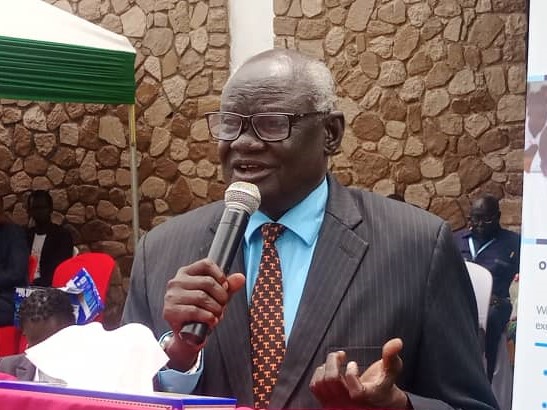
The Minister of Higher Education speaking during inauguration of the renovated administration block and other facilities at the University of Juba - Credit | Moyo Jacob\Eye Radio | May 4, 2022
The leader of the Federal Democratic Party says the citizens must decide on the applicable type of federal system of governance before the general elections in 2024.
Gabriel Changson Chang, whose FDP party is a member of the South Sudan Opposition Alliance, said that the parties to the peace agreement agreed on federalism during peace negotiations in Addis Ababa, Ethiopia.
The agreement did not stipulate the type of federalism but requires South Sudanese to decide the system.
However, Changson who is he current Minister of Higher Education Science and Technology, said the citizens must decide on the type of federalism best applicable, during the constitution-making process.
Speaking during the launch of his part headquarters in Juba on Saturday, Changson said federalism is the priority for his party.
“We the politicians to the 2018 peace agreement have agreed that the system of governance should be a federal system. Federalism is the priority for our party,” he said.
“Federalism has many types, so which one do the people of South Sudan want to have? Is it federalism, where the president will be the head of state, or a parliamentary system where the head of state will be the Prime Minister?”
“Or do we work with the two like in France, where you have a president for the nation and Prime Minister? So, this must be carried out and done before the end of 2024 because, at the end of 2024, we will have an election.”
His comment comes a month after the Minister of Federal Affairs reaffirmed that South Sudan would transition into a federal system of governance at the end of the current transitional period.
Losuba Ludoru Wongo said, after the general elections, a new government shall operate within a federal constitution.
Speaking to Eye Radio on Feb 26, 2023, Ludoru added that the unity government would use the current structure of governance to transition the country into federalism.
According to him, the federal system will differ in how different areas use their resources and how they also organize politically in order to achieve the really needed services.
In February, the extraordinary Council of Ministers meeting chaired by President Salva Kiir passed a “Federal Policy” document and the Strategic Plan 2022 – 2025 of the Ministry of Federal Affairs.
The Federal Policy provides a guiding tool that has the principal direction of the federal system that South Sudan is expected to adopt during the Constitution making.
The document also highlighted the principle of federalism such as the devolution of administrative powers, political organization and arrangement within the federal system, and the physical aspect of federation such as resource distributions at a different level of government.
According to Ludoru, his ministry planned to hold a National Conference on Federalism that will bring participants from the ten states and administrative areas.
The conference will discuss and give guidance on what to be included in the federal constitution and address misconceptions surrounding federalism.
Under a federal-presidential system of government, the president serves both as head of state and head of government while the country keeps the current set-up of the national government, where there are 3 main branches: the executive, legislative, and judiciary.
However, instead of centralizing power with the national government, the country could have individual states with their own federal legislature and state governments.
Under this model, national concerns would be addressed by the federal government under the president.
These include national security, monetary policy, and foreign relations, among others.
Domestic or state issues, meanwhile, will be handled by state governments.
Countries that have a federal-presidential system of government include the United States, Mexico, Brazil, Argentina, Venezuela, and Nigeria, among others.
Meanwhile, a federal parliamentary republic refers to a federation of states with a republican form of government that is dependent upon the confidence of parliaments at both the national and sub-national levels.
It is a combination of the government republic and the parliamentary republic.
Support Eye Radio, the first independent radio broadcaster of news, information & entertainment in South Sudan.
Make a monthly or a one off contribution.
Copyright 2024. All rights reserved. Eye Radio is a product of Eye Media Limited.